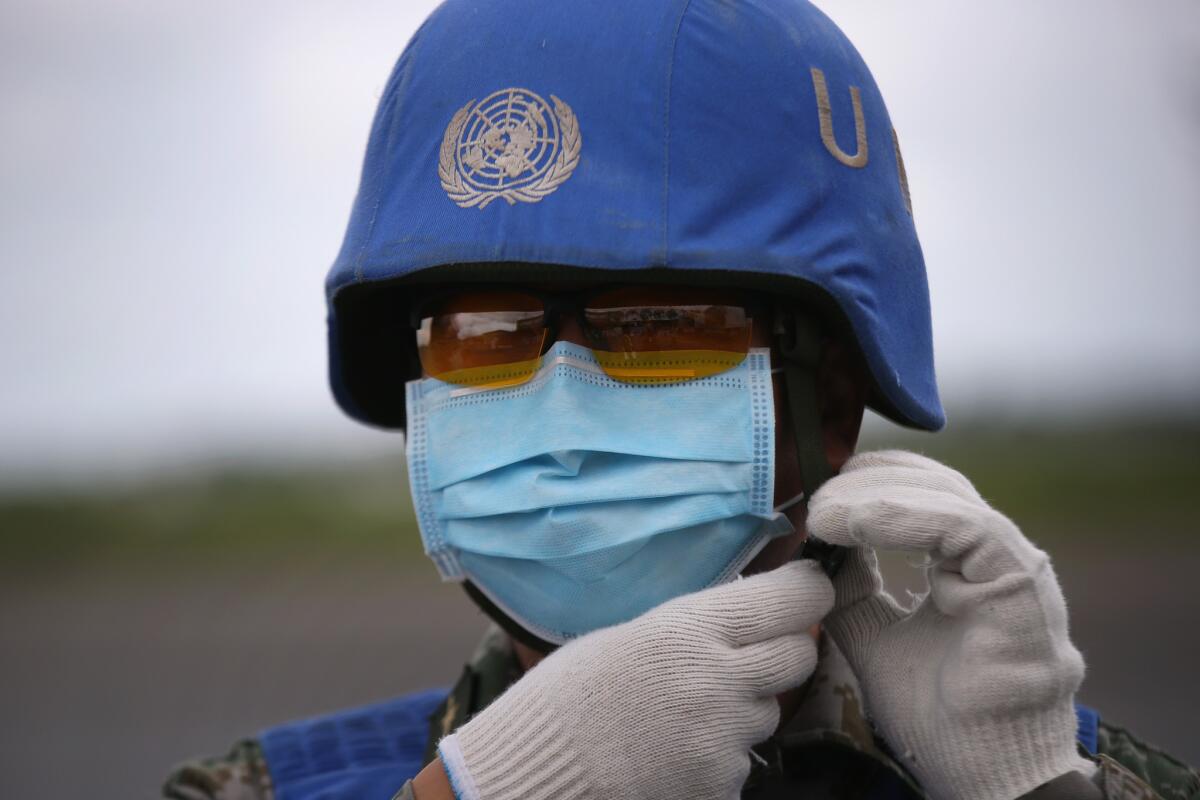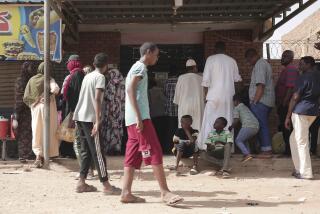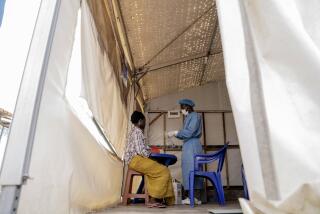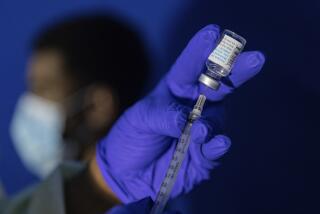Ebola cases in West Africa may be vastly underreported, WHO says

The United Nations health agency said Thursday that the worldâs worst Ebola outbreak is accelerating and could infect more than 20,000 people before it is brought under control.
More than 3,000 suspected and confirmed cases have been reported in four West African countries, and at least 1,552 people have died of the virus, according to figures released by the World Health Organization. But the actual number of cases in areas of intense transmission could be two to four times those reported, WHO said.
âThis far outstrips any historic Ebola outbreak in numbers,â Dr. Bruce Aylward, the organizationâs assistant director-general for emergency operations, told reporters in Geneva. âThe largest outbreak in the past was about 400 cases.â
The disease has typically surfaced in remote, forest villages and killed most of its victims before it could spread very far. This is the first time an outbreak has extended to four countries, including densely populated urban centers.
The outbreak was first reported in Guinea in March and spread to Liberia, Sierra Leone and Nigeria. A separate Ebola outbreak has killed at least 13 people in the Democratic Republic of Congo but is not believed to be related to the infections in West Africa.
More than 40% of the cases have occurred in the last three weeks, although most are concentrated in only a few localities, WHO said. The fatality rate is 52%, lower than in previous outbreaks.
There is no vaccine or cure for the disease, which is spread through contact with bodily fluids.
The U.S. National Institutes of Health on Thursday announced the first clinical trials of a vaccine, which are to start next week in Bethesda, Md.
NIH Director Francis Collins called the development the latest in a series of âextraordinary measures to accelerate the pace of vaccine clinical trialsâ for the public health emergency in West Africa. The trials will attempt to demonstrate the safety of a vaccine against the Zaire strain of Ebola. Zaire is the former name of Congo, where the disease was first reported in 1976.
The effort will be the first of many trials aimed at supplying a vaccine to residents of countries where Ebola is endemic and to the health workers traveling there to care for them, said Dr. Anthony Fauci, director of the NIHâs National Institute of Allergy and Infectious Diseases. Initial results are expected by the end of the year, he said.
Later clinical trials are to take place in Britain and, after approval from the relevant authorities, in the West African countries of Gambia and Mali.
The trial vaccine, developed by the pharmaceutical giant GlaxoSmithKline, contains no infectious Ebola virus material. It is a chimpanzee adenovirus vector vaccine into which two Ebola genes have been inserted. Also to be tested in planned trials is at least one other vaccine candidate, developed by the Canadian Public Health Agency and licensed to NewLink Genetics Corp.
WHOâs assessment of the West African outbreak was contained in a plan aimed at stopping Ebola transmission in the affected countries within six to nine months and preventing it from spreading internationally. The strategy is expected to cost about $489 million and will need at least 750 international and 12,000 local health workers to implement, the Associated Press reported.
The international medical charity Doctors Without Borders, which has taken the lead in caring for Ebola patients in Africa, welcomed WHOâs road map but cautioned that it should not raise false hope.
âHuge questions remain about who will implement the elements in the plan,â said Brice de le Vingne, the groupâs operations director. âWho has the correct training for the variety of tasks that are detailed? How long will it take to train organizations to set up and run an Ebola management center? How long before any new centers become operational? Who will undertake the vitally important health education, contact tracing and safe burials in the affected communities?â
None of the organizations in the most affected countries â the U.N., WHO, local governments and aid groups, including Doctors Without Borders â are set up to respond on the scale necessary to make serious progress against the spread of the virus, he said in a statement.
In Liberia, the disease has already spread throughout the capital, Monrovia, a city of more than 1 million people, said Lindis Hurum, the doctors groupâs emergency coordinator in the country. Patients afraid of catching Ebola are going without treatment for other deadly diseases such as malaria. Schools are closed, airlines have suspended flights, and prices for food and other basics are going up.
âWe have 120 patients here in Monrovia,â Hurum said this week. âOur experience, our guidelines and our protocols, they are all based on smaller outbreaks in a rural environment.... So we have to come up with new strategies.â
Authorities in Nigeria, which had said the outbreak in that country was contained, confirmed the first fatality outside the city of Lagos on Thursday. The disease was taken to Nigeria by a Liberian American named Patrick Sawyer, who traveled to Lagos. He has died of the disease.
A man who came into contact with Sawyer evaded surveillance and traveled to the southern oil hub of Port Harcourt, Nigerian Health Minister Onyebuchi Chukwu told reporters. He survived but passed the virus to a doctor, who later died. The doctorâs wife was placed under quarantine and 70 other people are being followed, Chukwu said.
For more international news, follow @alexzavis on Twitter
More to Read
Sign up for Essential California
The most important California stories and recommendations in your inbox every morning.
You may occasionally receive promotional content from the Los Angeles Times.












